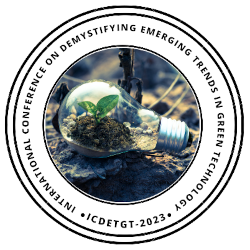Hi-Tech Institute of Engineering & Technology, located at Ghaziabad, Uttar Pradesh. Established in the year 2004, it is a private institute affiliated to Dr. A.P.J Abdul Kalam Technical University and approved by AICTE and MHRD. HIET Ghaziabad is known for its research centers and to facilitate the same it has many centers of excellence such as Technical Training and Industry Alliance (CTTIA), Incubator Sponsored from Ministry of Micro, Small & Medium Enterprises (MSME), Innovation Entrepreneurship Development Center (IEDC) and Center for Software Consultancy and Development (CSCD).
Our Vision
Hi-Tech Institute is committed to the integration of student learning, research and development by creating transformative learning opportunities that enrich the lives of our students. We strive to promote excellence and encourage student success by engaging students in the life of the campus community.
Our Mission
To disseminate knowledge, Hi-Tech advances to generate creative and entrepreneurial leaders for the knowledge-based economy. In this line, we support the diverse needs of our student body, foster active learning and contribute to their personal and academic development. We are committed to an interactive, participative and technologically-enabled learning experience. To further this, we aspire to provide a rewarding and challenging environment for faculty, staff and students to kindle and sustain a passion for excellence.
About The ICDETGT-2023
Conference Tracks
Publishing & Indexing


Accepted and presented papers will be submitted for inclusion into Bentham Science subject to meeting Bentham Science’s scope and quality requirements
Important Dates
| Paper submission starts on | March 31, 2023 |
| Final paper submission Date | April 15, 2023 Midnight |
| Notification of Acceptance Date | April 20, 2023 Onwards |
| Registration Fee End Date | April 22, 2023 Midnight |
| Conference Dates | April 29 – 30, 2023 |
| Participants | National Participants - (INR) | International Participants - (USD) |
|---|---|---|
| Corporate Participants | Rs 8000 | USD 250 |
| Academicians/Research Scholar | Rs 7500 | USD 200 |
| Students (UG/PG) | Rs 6500 | USD 100 |
| Co-author/Attendee | Rs 1000 | USD 75 |
Track 1: Green Technology in ICT
- Artificial Intelligence and Machine Learning
- Wireless Communication and Sensor Networks
- Pattern Recognition and Image Understanding
- Artificial Neural Networks, Fuzzy Systems and Hybrid Systems
- Computational Intelligence and Evolutionary Computation
- E–Systems and Computer Systems
- Human-Centered Computing
- Knowledge Engineering Methods and Practices
- Big Data Acquisition, Integration, Cleaning, and Best Practices
- Big Data Applications for Internet of Things
- Network Coding and Information Theory
- Intelligent cloud-support communications
- Robotics Engineering
- Natural Language Processing
- Next Generation Networks
Track 2: Green Technologies in Electrical
- Smart Grid: Design & Engineering
- Computer Applications in Power Systems
- Configurable & Modular Power Electronics
- Micro-Grid: Modeling & Simulation
- Power System Operation & Control
- Renewable Energy Integration
- Hybrid Energy Systems
- Advance Solar PV Materials
- Solar PV Energy Systems
- Electric Vehicle Technology
- Energy-Efficient Infrastructure
- Smart City and Case Studies
Track 3: Green Technologies in RF & Microwave
- Body Area Network
- RF and Photonics Devices
- Cognitive Communication
- RF Antenna Modeling and Design
Track4: Green Industrial Automation and Control Signal Processing
- Signal Processing Algorithms and Architectures
- Biomedical Signal and Image Processing
- Machine and Deep learning for Speech and Audio Signal Processing
- Signal Processing for Communication and Networking
- Sensor Array and Multichannel Signal Processing
Track5: Green Standardizations and Benchmarks for ICT in Microelectronics
- New Age Nanomaterials
- Plasmonic Materials and Devices
- Low Power Awareness Analysis
- Design of MEMS Devices
- 3D ICs
Track6: Green Technologies for Industrial Networking
- Green Communication Systems and Network
- Optical Networks and System
- Software defined Wireless Networks
- Vehicular Wireless Networks
Track7: Green Technologies enabled in Vehicles, Homes & Buildings
- Embedded Real Time Systems
- Embedded Application in Agriculture
- Embedded Application for Development of Rural Economy and Urban Floods
- 5G Networks and IOT
Track 8: Green Technologies research/industrial areas
- Improving Green-ness
- Eco-Design-energy efficiency
- Green-oriented protocols, computation and services
- Circuitry for energy harvesting and scavenging
- Underwater energy harvesting
- Energy harvesting from stall flutter limit cycle oscillations
- Ultrasound acoustic wave energy transfer and harvesting
- Ocean wave vibration energy harvesting
- Atmosphere monitoring and Green-technologies for Environmental Challenges
- Remote monitoring the batteries
- Battery materials and mechanisms
- Hybrid solar energy – thermal energy – wind energy
- Energy storage
- Grid-oriented energy systems
- Vehicular pollution
- Electric/hybrid vehicles
- Harvesting of marine microalgae/agricultural crop for biodiesel production
- Power distribution grids
- Optimal planning in smart cities and smart meters
- Green-ness incentives
- Green-ness education and motivation
Track 9: Green Technologies for Sustainability in Energy and Buildings
- Governance of Sustainability in Energy and Buildings
- Green Building and Energy Efficiency
- Green Buildings: Innovation and Sustainability
- Green Information and Communication Technology
- High Efficiency Power Storage Systems
- Intelligent Buildings
- Intelligent Systems for Sustainability
- Novel Primary Sources
- People in Intelligent Buildings and Cities
- Policy Perspective on Sustainability in Energy and Buildings
- Renewable Energy Technologies
- Sustainability and Energy Efficiency
- Sustainability in Energy and Buildings
- Sustainability in Energy and Buildings and Information and Communication Technology
- Sustainable Building Technologies
- The Future of Sustainability in Energy and Buildings

